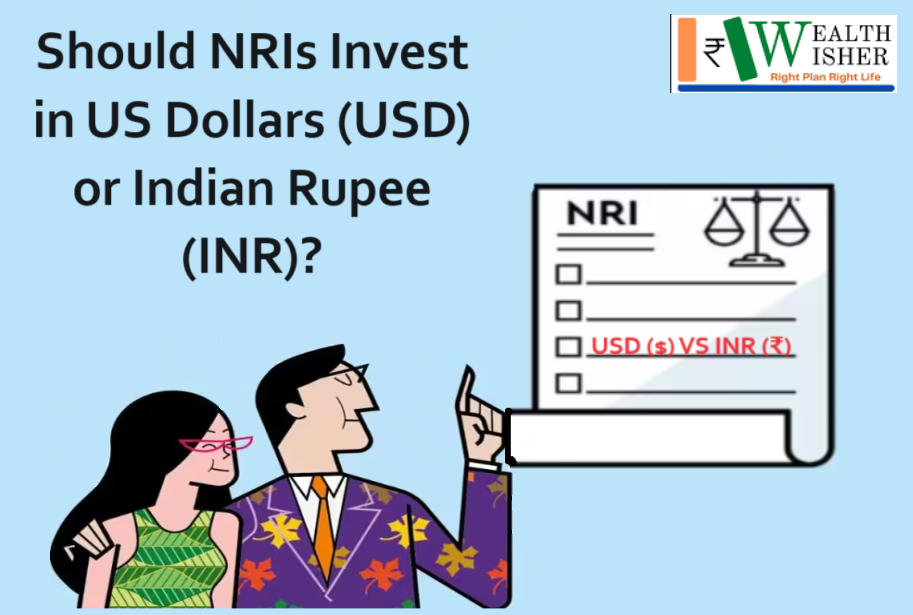NRIs Investment in US Dollars or Indian Rupee is a complex and important decision. There are several factors to consider, and making the right choice requires careful evaluation. Let’s explore these considerations together.
But why would NRI investors invest? NRIs invest due to a host of factors. This can be – Diversification, Better Returns, Variety of Investment availability, and exploring economic growth & safety of their funds. So choice of funds for NRIs Investment in US Dollars or Indian Rupee forms an important part of this equation of investments.
Factors Affecting NRIs’ Investment in US Dollars or Indian Rupees
Understanding Economic Stability and Currency Strength
Before making an investment decision regarding NRI’s Investment in US Dollars or Indian Rupee NRIs need to assess the economic stability and currency strength of both the United States and India.
The US Dollar is known for its stability, backed by a strong economy and reliable monetary policies. The dollar is also called world currency as more than 70% of dollar trade exists outside the US.
On the other hand, the Indian Rupee is more susceptible to fluctuations due to various factors, including domestic economic conditions and global market trends.
Analyzing Inflation and Interest Rates
Inflation rates and interest rate disparities between the US and India play a significant role in investment decisions. India often experiences higher inflation rates than the US, which can affect the purchasing power of the Indian Rupee over time.
Off late due to COVID, both countries faced heavy inflation & frequent changes in interest rates. But this is a matter of emergency and one should look at 10 years average minimum.
However, higher interest rates in India may offer opportunities for NRIs seeking better investment returns. Higher deposit rates mean more nominal growth and returns on deposits.
Mitigating Currency Exchange Risk
Investing in foreign currencies exposes NRIs to currency exchange risk.
NRIs holding INR-denominated assets face the risk of depreciation if the Indian Rupee weakens against their home currency.
Conversely, investing in USD-denominated assets may provide some protection against currency depreciation risks, although exchange rate fluctuations can still impact investment returns.
The Indian currency has lost 5-6% annually against the USD as per data from the last 30 years.
The MSCI India index delivered 9.5% in rupee terms in the past 10 years but returned just 5.4% in dollar terms.
It means if you are converting dollars to INR, to invest and later reconvert it to INR, the returns must be over this depreciation also. Then only you will make real returns.
Your Long-term Plans will decide on NRIs Investment in US Dollars or Indian Rupee
Normally NRIs fall into 3 categories – Plan to settle abroad, plan to come back & undecided.

If you plan to settle abroad, you would maintain NRI status, so better to keep money in your country of stay. NRE money is usually taxed free hence has an advantage of cost when invested abroad.
Indian markets are good yielding only if the NRI plans to use the money in India say buy a house or help his parents. It is best to keep Indian finances and taxes simple if the intention is not to return.
If you do not wish to settle abroad, you should keep on sending money to India and investing here so that you save money on exchange. You have local needs hence money should be available in India. Also, after some years your tax status changes, and tax liability will increase. Returns in India will help you bridge this gap.
The “maybe” category should take a balanced view till their position is clear.
Embracing Diversification Strategies
Diversification is key to managing investment risk effectively. NRIs should diversify their investment portfolios across different assets, currencies, and geographic regions to mitigate risks and optimize returns.
NRIs Investment in US Dollars or Indian Rupee denominated assets enhances diversification and allows NRIs to capitalize on opportunities in various markets.
Considering Market Volatility and Economic Trends
Monitoring global economic indicators, geopolitical events, and market sentiments helps NRIs anticipate market fluctuations and adjust their investment strategies accordingly.
One market may offer you opportunities in these trends while another may not.
Remaining flexible and adaptable is essential for long-term investment success.
Weighing Long-term Financial Goals
Aligning investment strategies with long-term financial goals is vital for NRIs. Whether aiming for wealth preservation, capital appreciation, or income generation.
NRI investment in US Dollars or Indian Rupee should consider risk tolerance, investment horizon, and liquidity needs.
This helps NRIs develop tailored investment plans that are consistent with their financial objectives.
E.g., if an NRI wishes to settle in the US after retirement, he should invest in USD. If he plans to send kids to a US university, it is better to start accumulating or investing dollars in his/her name.
In conclusion, the decision regarding NRIs Investment in US Dollars or Indian Rupee requires careful consideration of economic stability, inflation rates, interest rate differentials, currency exchange risks, tax implications, diversification strategies, market volatility, long-term financial goals, and continuous learning. By evaluating these factors and seeking expert advice, NRIs can develop well-informed investment strategies that align with their financial objectives and risk tolerance.
Hope you like this information on NRIs Investment in US Dollars or Indian Rupee. Do let us know in the comments section below.








